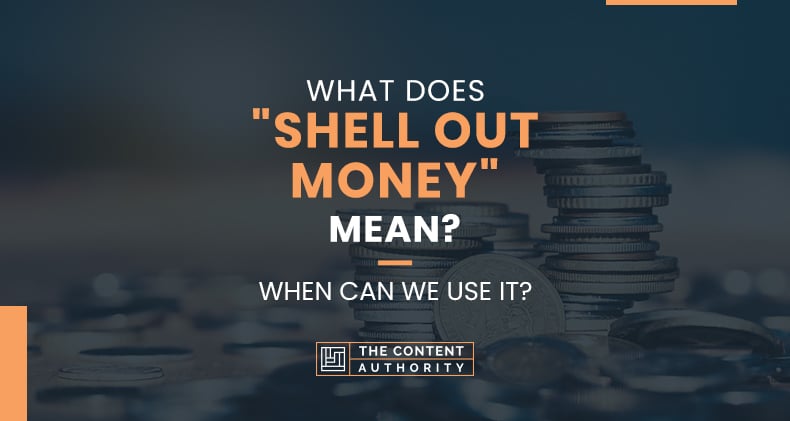It is a phrase that infers one must pay for something that was not anticipated or wanted. We can use the phrase when we receive an unexpected bill.
“Shell out money” means to pay an important amount of money for an unwanted expense, an unfortunate situation where we are required to pay for something that we had not thought to be our responsibility, like paying a lot of money for a parking ticket.
There are always moments in life where the situation demands that we foot the bill for an unexpected charge or, “shell out money” when it’s not our responsibility. Read on to find out the true meaning of this idiom of English, and when to use it.
What Does, “Shelling Out Money” Look Like?

Nearly all of us at one moment or other have been burdened with an unwanted expense. A bill resulting from an unexpected situation that falls directly to us to pay for. This expectation to pay is housed within the idiom, “shell out money”, in its simplest form, the relatively new idiom, or a form of an expression that is natural in a language of “shell out money” quite literally means, paying when you would rather not.
The situation can arise spontaneously, or can be waiting for you to arrive for sometime. The payment could relate to a number of occasions, like your son’s tuition at college each month even though he is working and could pay himself, or one discrete payment like paying to have your car towed to the repair shop. While sometimes shockingly expensive, it only happens on that one discrete occasion.
Let’s now have a more detailed examination of this phrase, and how to incorporate it to our everyday vocabulary.
Understanding The Idiom, “Shelling Out Money” And Its Implications In Relationships With Others When Used.

The phrase “shelling out money” is a relatively recent idiom of English used to describe an unwanted or unexpected payment. The phrase implies that on a particular occasion, when we least expect it, a bill arrives and the resulting bill becomes our responsibility.
The sense of inequity of the situation can have us feel put upon, often we feel in order to keep peace and harmony in a situation, that it makes more sense to simply pay the bill, even when it’s not our direct responsibility.
An unexpected moment to “shell out money” can occur without warning, these are the accidents and emergencies that come to us in life. Fortunately, day to day life can be somewhat predictable, but when an unanticipated moment arrives, we may have to take action and pay.
If our car breaks down in traffic, we may have to “shell out money” to get it to a safe place for repairs. Likewise if our daughter loses her tablet in the park, we may have to “shell out money” for a new one for her to complete her homework assignments.
The unwanted “shelling out money” can take much different and certainly more emotional contexts. When something is unwanted, it exists as a situation we don’t feel responsible for. While we may be expected to take care of family bills, we may feel that paying for the bill of our friend is quite a different matter. A good example of this is when you and your friend go out for dinner, and suddenly your friend realizes he has forgotten his wallet at his home. While it may truly have been an accident on your friends part, you still feel resentment at having to pay the bill for him; certainly an unwanted payment for a man with his own resources to pay.
The phrase “shell out money” can come to us from both familiar and unfamiliar sources. Our partner, coworker, friend, or boss, put us on the spot to pay a bill of theirs. But a need to “shell out money” can come to us from unfamiliar sources as well. For example, a meter maid can give us a parking ticket that must be paid, or the person with whom you share the cab fare, leaves the cab without paying, and the bill becomes your problem.
On rare occasions, the phrase can be used sarcastically by others, who notice that we have no objection to paying. If you for example, jump to the aid of a friend to help him buy something he just can’t afford, you may want to pick fun by saying, “I guess I have to, shell out money for you!” You and your friend can share a fun filled moment together to lighten the fact that your friend doesn’t have much money.
“Shelling out money” can at times come with a heavy price tag, for example, in order to resolve a divorce process, it may require that you pay much more money to settle than you had previously imagined.The old saying “peace has no price” literally applied, could have you shell out much more money than is first thought.
Historical Significance Of “Shell Out Money”

Our own personal history tells us that his phrase can pass through moments in our lives with a degree of frequency. While it is a common enough idiom today, the first time it was used was in recent history dating back to, Moral Tales For Young People (1801), by the Anglo-Irish novelist and educationist Maria Edgeworth (1768-1849)
“One of you, it’s plain, must shell out your corianders.” In this case coriander, a type of seed, is being used by the author as a metaphor for money.
Again in 1849, the idiom was used in the periodical, Life in London, by journalist Pierce Egan who wrote, “Though I’m napping my bib, yet I hope he’ll die proud,
And all the prigs shell out to buy him a shroud!
Today, the idiom continues to be used in this context of unwanted or unexpected payment, with little change or diversification. It is however in much more common usage now as it seems more and more unanticipated demands to, ‘shell out money, ‘ are coming our way.
Examples Of The Phrase In A Sentence
Here are some examples of how to use this phrase in a sentence:
- If you accept his invitation to dinner, be ready to shell out some serious amount of cash.
- Consider this party you want will not be cheap, you need to shell out a little bit of money.
- You’re lucky i’m not a materialistic person, because certainly you don’t really have the money to shell out on expensive gifts.
To “Shell Out Money” At Work.
It is not uncommon these days for our work projects as well as our corporate relation building to demand us to “shell out money”. If we have a limited operations budget, or no budget at all, it may become necessary for us to “shell out money” in order to complete a task that is of quality.
We are using our own money in an unwanted manner to support task completion in our work. This often leads to resentment if ultimately our presentation does not go well. We may feel shorted by our company and in the end, do inferior presentations so as not to pay.
It may also be important to take the boss for dinner in order to discuss your next raise or promotion. Again we are footing the bill when we would rather not, in hopes of some future benefit. It is normal to set a positive environment to better risk asking for a raise. If the food is good, and the boss doesn’t have to pay, it may be just enough to tip the scales in our favour. If after all this effort and cost, we still see no raise or promotion, we may feel resentment for paying for the dinner, making it the final dinner bell for the boss at our expense.
What We Need To Know About The Idiom “Shell Out Money”
It is important for us to know that while nobody wants to hear this phrase, it is something that randomly presents itself in our lives from time to time. Coming when least expected, a need for us to pay money into a situation to resolve it is common place for us all. This being the case, the bad feelings of anger and resentment we feel, is only really hurting ourselves. We are wise to simply accept the responsibility and pay the bill with honor and integrity. It may fall to us to pay today, but it will be someone else tomorrow, and they may be paying our bill.
English Idioms
Conclusion
When can we coin the phrase “shell out money” when we must pay the unexpected or unwanted bill of ourselves or others. A situation that might be uncomfortable, but necessary in order to resolve the situation for the better. Life is full of moments where we feel unjustly put in a situation of paying a bill.
It is in these moments that our good nature and integrity shine through when we assume responsibility in the situation and move through it to a place of peace. All the while remembering that today we have to pay, but tomorrow it could be someone else; and they may well need to “shell out money” for us!
Shawn Manaher is the founder and CEO of The Content Authority. He’s one part content manager, one part writing ninja organizer, and two parts leader of top content creators. You don’t even want to know what he calls pancakes.

